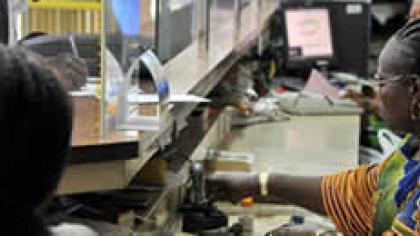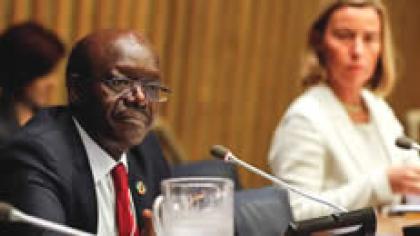Translating the multidimensional trade-migration-development nexus in benefits for developing countries and countries with economies in transition.
Trade and migration are related to development in many ways:
-
Trade works for migration. Trade and the trading system provide tools for better migration governance, promoting the recognition of qualifications and other initiatives that reduce the costs of labour migration and promote ethical recruitment.
-
Migration works for the economy and trade of countries of destination, transit and origin. Temporary trade-related labour mobility has important benefits as it reduces the incentives for irregular migration and promotes brain circulation instead of brain drain. Trade flows can be enhanced by leveraging diaspora networks to circumvent trade barriers and reduce trade-related transaction costs.
-
Infrastructure services work for trade and migration. ICT-enabled trade has the potential to reduce some barriers to trade in services, including through the movement of people. Financial inclusion is also relevant as financial services may contribute to facilitated, speedier, safer and less costly remittance flows, and to maximize their developmental impact.
We provide analyses, policy options and platforms for countries to build consensus on how to maximise development benefits from the linkages between trade and migration.
Our objectives:
Enhancing understanding on benefits of migrants and migration to trade, trading system and services, and vice-versa, in both origin and destination countries.
-
Providing tools that enable contributions to the intergovernmental negotiations of the Global Compact for Safe, Orderly and Regular Migration.
-
Identifying coherent policy approaches to harvest benefits from the trade-migration-development nexus and, in particular, to mainstream global frameworks into national best-fit trade and services policy frameworks.
Our focus areas include:
-
Trade, the trading system and migration.
-
Services economy and trade and migration.
-
Financial inclusion, digital financial services and migrant's remittances.
- Synergies of UNCTAD's Work
-
Each of the focus areas of our work on trade and migration builds on synergies with broader UNCTAD work.
Trade, the trading system and migration
UNCTAD is represented in the meetings of the WTO Services Council and subsidiary bodies, and follows-up on their proposals and deliberations.
The multidimensional linkages of trade and migration are also supported by UNCTAD's work in trade policy and negotiations, including in Trade Policy Frameworks Reviews and also in the Doha Development Agenda and on its services dimension which comprised trade through the movement of persons under the GATS.
This work also focuses on regional integration processes, including contributing to discussions and negotiations on the African CFTA. This comprises services liberalization including the supply of services through the movement of persons.
This focus area is further supported by UNCTAD's work on trade, employment and development, including the global study on "The impact of trade and trade agreements on employment in developing countries" and country case-studies on Ecuador, Senegal and South-Africa.
Services economy and trade and migration
UNCTAD has been supporting LDCs in the context of the Doha round services negotiations, to pursue development benefits from the current waiver enabling WTO members to provide preferential market access to services and service suppliers of LDCs to their markets. This can be viewed as an opportunity for development and better mobility.
UNCTAD has also analysed several proposals discussed at the WTO with potential impact on the movement of persons under the GATS, including the proposal on possible elements of an agreement on trade facilitation in services analysed at UNCTAD's Global Services Forum in July 2016.
UNCTAD's Services Policy Reviews (SPRs) also support countries in these linkages, by providing a thorough and customized analysis of the services economy and trade, with a methodology that addresses all relevant modes of trading services including Mode 4.
As such, SPRs present policy options to promote the development benefits of services provided by these temporary migrants, including through the best use of economic integration and cooperation and trade agreements, at bilateral, regional and international levels. This encompasses inter alia processes in Bangladesh, Paraguay, and Peru. The SPR of Bangladesh in particular contains an in-depth analysis of labour force exports.
Financial inclusion, digital financial services and migrant's remittances
UNCTAD has supported members' endeavours in fostering financial inclusion and its development contribution to migrants and remittances through SPRs, taking stock of the linkages between financial inclusion and remittances, trade and development implications of financial services, digital financial services, multi-year expert meetings on services, trade and development, and the Global Services Forum. SPRs in particular have a focus on infrastructure services, including on financial services, as it has been the case for e.g. Paraguay and Nicaragua.
This focus includes the regulatory objective of universal access and acknowledges the important development potential of financial services and financial inclusion for migration.
- Partnerships
-
Global Compact for Safe, Orderly and Regular Migration (GCM)
UNCTAD supports the intergovernmental negotiations leading to the adoption of a Global Compact for Safe, Orderly, and Regular Migration, a process launched in the context of the New York Declaration for Refugees and Migrants.
Global Forum on Migration and Development (GFMD)
UNCTAD participates and contributes to the GFMD, an initiative of the United Nations Member States to address the migration and development interconnections.
Global Migration Group (GMG)
UNCTAD participates and contributes to the GMG and to several of its working groups.
The GMG is a United Nations inter-agency group to promote the wider application of all relevant international and regional instruments and norms relating to migration, and to encourage the adoption of more coherent, comprehensive and better coordinated approaches to the issue of international migration.
Focus Group on Digital Financial Services (DFS)
UNCTAD participates in this Focus Group devoted to explore ways to improve development benefits - including on remittances - of making available financial services via digital means by building on improved reach and reduced costs.
UNCTAD co-Chairs the Ecosystem Working Group and has collaborated in mapping the DFS ecosystem encompassing policy, regulatory and supervision enablers, players, and products and services - such as remittances.
The Focus Group is hosted by the International Telecommunication Union (ITU) and Chaired by the Gates Foundation, and it is an open platform for digital financial services stakeholders, including regulators, private sector and international organizations, to share knowledge and lessons learned to identify frameworks needed to support the scaling up of DFS usage.




